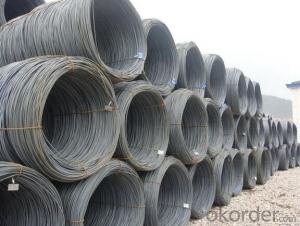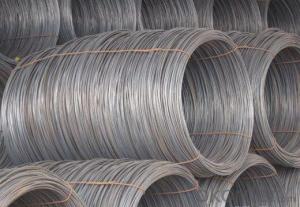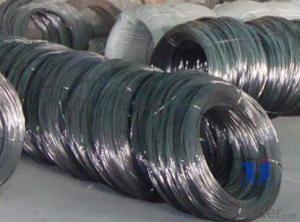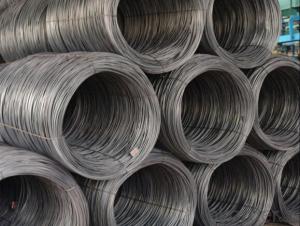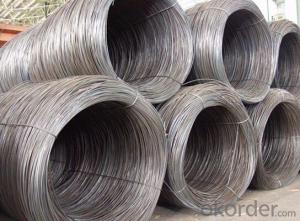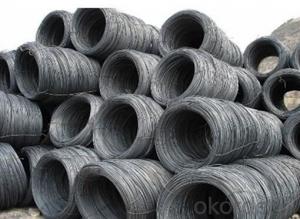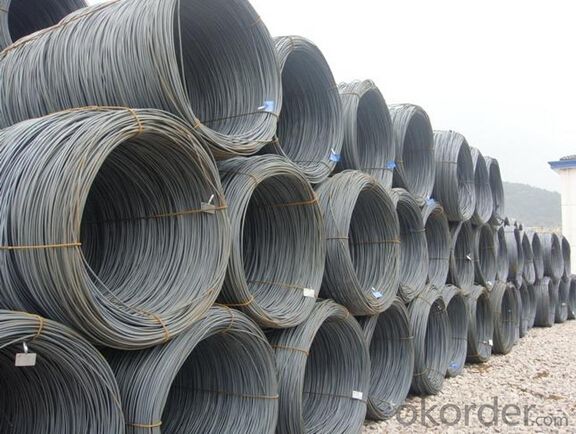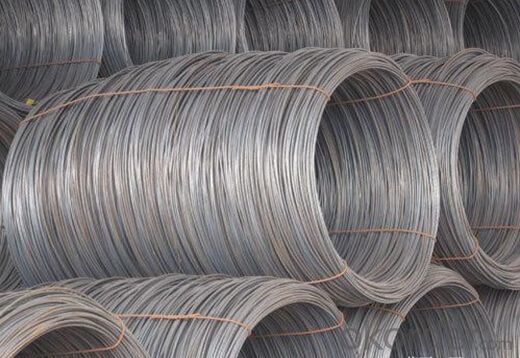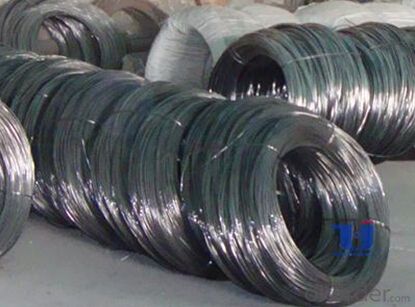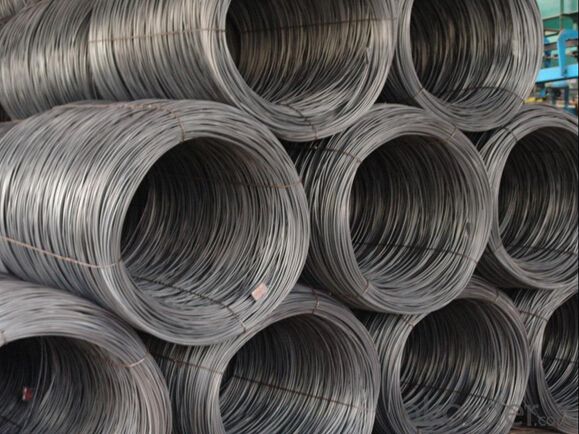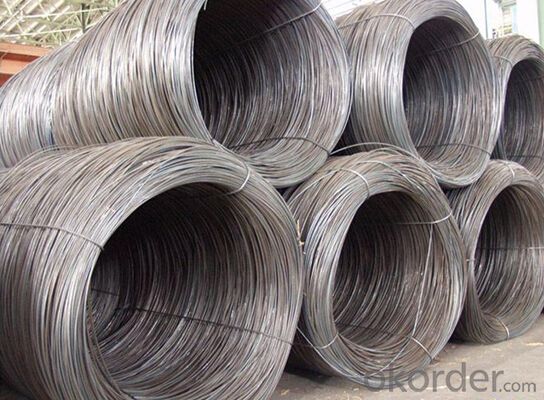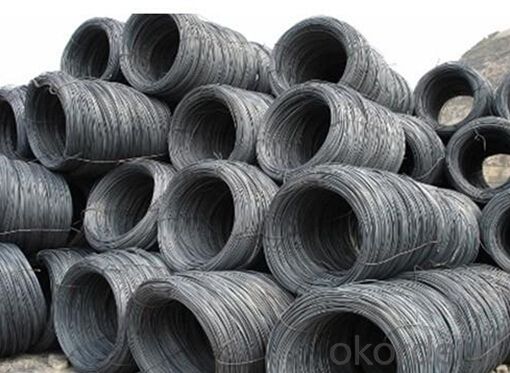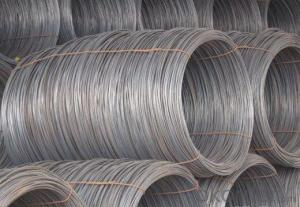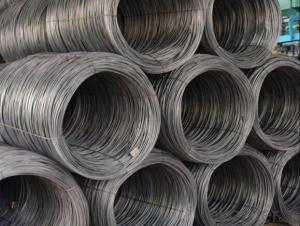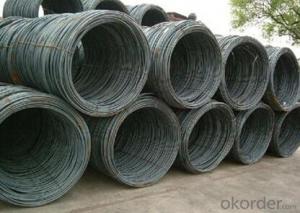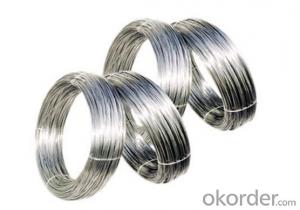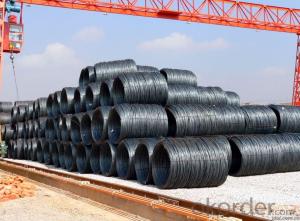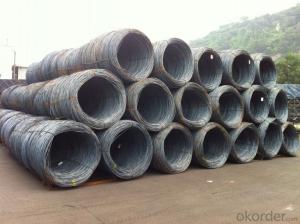Grade SAE 1018 Hot Rolled Steel Wire Rod in Coils
- Loading Port:
- Tianjin
- Payment Terms:
- TT OR LC
- Min Order Qty:
- 3 m.t.
- Supply Capability:
- 10000 m.t./month
OKorder Service Pledge
Quality Product, Order Online Tracking, Timely Delivery
OKorder Financial Service
Credit Rating, Credit Services, Credit Purchasing
You Might Also Like
Specification
Type:
Carbon Steel,Spring Steel,Bearing Steel,Gear Steel,Deformed Steel,Stainless Steel,Alloy Steel
Shape:
Steel Coil,Steel Sheet,Steel Wire Rod,Steel Flat Bar,Steel Square Bar,Steel Angle,Steel Round Bar,Steel Billets
Technique:
Hot Rolled,Cold Rolled,Cold Drawn,ERW,Forged,Saw,Extruded,EFW,Spring
Surface Treatment:
Galvanized,Coated,Copper Coated,Color Coated,Oiled,Dry,Chromed Passivation,Polished,Bright,Black,PVDF Coated
Certification:
ISO,SGS,BV,IBR,RoHS,CE,API,BSI,UL
Thickness:
5.5mm, 6.5mm, 8-14mm
Width:
5.5mm, 6.5mm, 8-14mm
Length:
In coils
Outer Diameter:
5.5mm, 6.5mm, 8-14mm
Net Weight:
2m.t.
Packaging:
seaworthy packaging
Grade SAE 1018 Hot Rolled Steel Wire Rod in Coils
Detailed Information of the Grade SAE 1018 Hot Rolled Steel Wire Rod in Coils
| Name | Hot Rolled High Carbon Wire Rod |
| Shape | Round Bar/Square Bar/Flat Bar/Plate/Wire |
| Standard | GB/ASTM/SAE/AISI/DIN/JIS/EN/BS |
| Surface Treatment: | Black/Peeling/Polished/Machined |
| Delivery Condition: | Hot Rolled or Forged/Peeled or Black Surface |
| Test | SGS/UT 100% Elements Testing |
| Certificate: | ISO/Mill Certificate |
| Service: | 24 hours online service / |
| more than 20 years trading and manufacture | |
| Quality Assurance: | the third party inspection, such as SGS, BV, TUV…etc. is acceptable |
| Packaging Details: | Seaworthy Packaging or as per customer's packing instruction |
Chemical Composition of the Grade SAE 1018 Hot Rolled Steel Wire Rod in Coils
| Grade | Chemical Composition(%) | |||||
| C | Mn | Si | S | P | B | |
| SAE1006B | 0.03~O.07 | ≤0.32 | ≤0.30 | ≤0.045 | ≤0.040 | >0.0008 |
| Mechanical properties | ||||||
| Yield strength(N/mm2) | Tensile strength(N/mm2) | Elongation(%) | ||||
| 250-280 | 350-380 | ≥32 | ||||
Company Introduction the Grade SAE 1018 Hot Rolled Steel Wire Rod in Coils
CNBM International Corporation is the most import and export platform of CNBM group(China National Building Material Group Corporation) ,which is a state-owned enterprise, ranked in 270th of Fortune Global 500 in 2015.
With its advantages, CNBM International are mainly concentrate on Cement, Glass, Iron and Steel, Ceramics industries and devotes herself for supplying high quality series of refractories as well as technical consultancies and logistics solution.
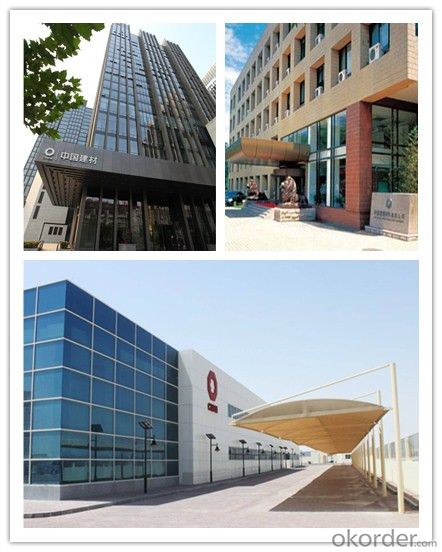
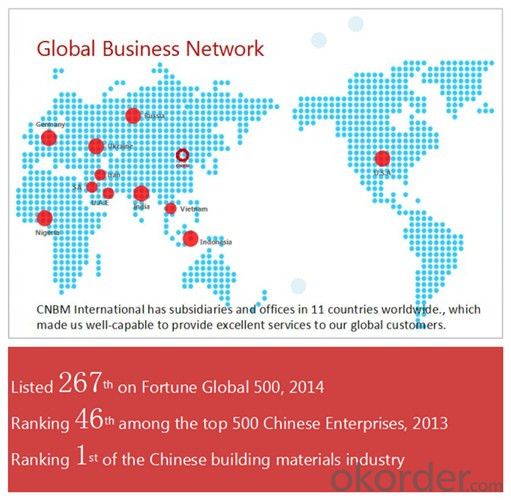
| After-sale service | CNBM provides the services and support you need for every step of our cooperation. We’re the business partners you can trust; you can relax and get on with doing business. |
| For any problem, please kindly contact us at any your convenient time, we’ll reply you in our first priority within 24 hours | |
| Advantages | Industry experience over 20 years. |
| Shipment of goods -More than 70 countries worldwide. | |
| The most convenient transport and prompt delivery. | |
| Competitive price with best service. | |
| High technical production line with top quality products. | |
| High reputation based on best quality products. |
Packaging & Delivery the Grade SAE 1018 Hot Rolled Steel Wire Rod in Coils
| Packaging Detail | Sea worthy packing /as per customer's packing instruction |
| Delivery Detail | 15 ~ 40 days after receiving the deposit |
Products Show
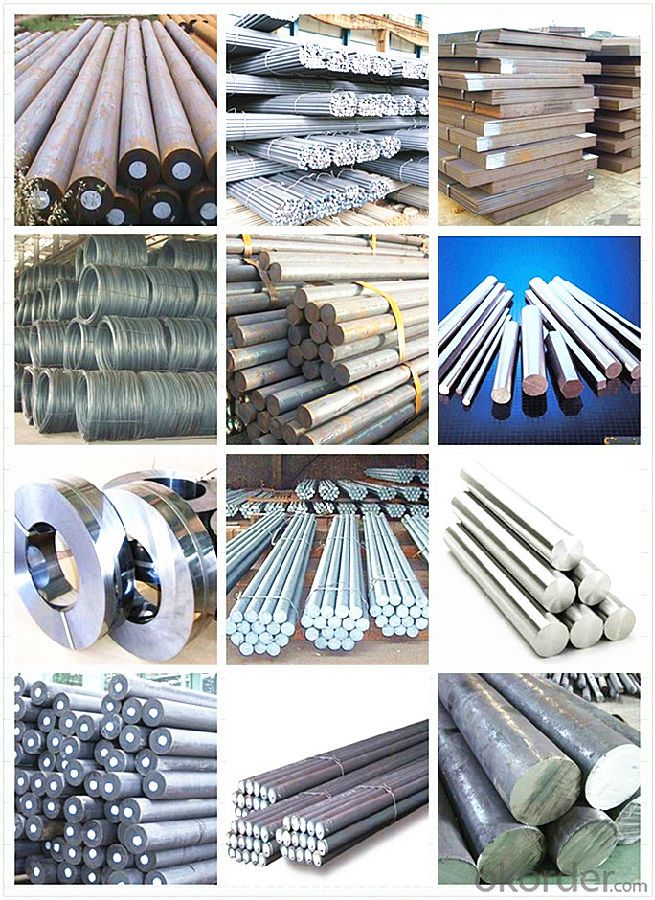
FAQ:
| Are you a trader or manufacturer? | Manufacturer |
| What’s the MOQ? | 3 metric ton |
| What’s your delivery time? | 15-35 days after downpayment received |
| Do you Accept OEM service? | Yes |
| what’s your delivery terms? | FOB/CFR/CIF |
| What's the Payment Terms? | 30% as deposit,70% before shipment by T/T |
| Western Union acceptable for small amount. | |
| L/C acceptable for large amount. | |
| Scrow ,Paybal,Alipay are also ok | |
| Why choose us? | Chose happens because of quality, then price, We can give you both. |
| Additionally, we can also offer professional products inquiry, products knowledge train (for agents), smooth goods delivery, excellent customer solution proposals. | |
| What's your available port of Shipment? | Main Port, China |
| What’s your featured services? | Our service formula: good quality+ good price+ good service=customer's trust |
| Where are your Market? | Covering more than 160 countries in the world |
- Q: What grade of iron powder should be used for processing special steel? Are there any other elements on the request? How much are they?
- The main special steel carbon structural steel, carbon tool steel, carbon spring steel, alloy spring steel, alloy structural steel, bearing steel, alloy tool steel, alloy tool steel, high-speed tool steel, stainless steel, heat-resistant steel and high-temperature alloy, precision alloy, gold and other electric heating.
- Q: How is precipitation-hardening steel used in aerospace applications?
- Precipitation-hardening steel is widely used in aerospace applications due to its exceptional strength-to-weight ratio and resistance to corrosion. This type of steel is heat-treated to create a fine dispersion of precipitates, which significantly enhances its mechanical properties. In aerospace, it is commonly used for manufacturing critical components such as landing gear, structural frames, and engine parts. These materials provide the necessary strength and durability required to withstand the demanding conditions of flight while reducing weight to improve fuel efficiency and overall performance.
- Q: What are the corrosion resistance properties of special steel?
- Special steel, also known as stainless steel, exhibits excellent corrosion resistance properties. This is primarily due to the presence of chromium, which forms a protective layer on the surface of the steel, preventing oxidation and corrosion. Additionally, special steel alloys may contain other elements such as nickel, molybdenum, and titanium, further enhancing their corrosion resistance. These properties make special steel highly suitable for various applications in industries such as construction, automotive, and aerospace, where resistance to corrosion is essential for long-term durability and performance.
- Q: How does special steel contribute to the performance of industrial machinery?
- Special steel contributes to the performance of industrial machinery by providing enhanced strength, durability, and resistance to corrosion and wear. It enables the manufacturing of components that can withstand high temperatures, heavy loads, and harsh operating conditions, thereby improving the overall efficiency and lifespan of the machinery. Additionally, special steel alloys offer excellent machinability and formability, allowing for precise and complex designs, ultimately enhancing the functionality and reliability of industrial machinery.
- Q: How does special steel contribute to the power transmission sector?
- Special steel plays a crucial role in the power transmission sector by offering enhanced strength, durability, and corrosion resistance. It is used to manufacture various components like gears, shafts, bearings, and turbines, which are essential for transmitting power efficiently and reliably. The exceptional properties of special steel ensure that these components can withstand high loads, extreme temperatures, and harsh operating conditions, thus contributing to the overall efficiency and reliability of power transmission systems.
- Q: How does special steel perform in terms of magnetic properties?
- Special steel can exhibit a wide range of magnetic properties depending on its composition and processing. Some special steels, such as stainless steel, are generally non-magnetic or have very low magnetic permeability. However, certain types of special steel, such as tool steel or high-speed steel, can be engineered to possess magnetic properties suitable for specific applications, such as magnetic tools or electrical transformers. Overall, the magnetic properties of special steel can be tailored to meet the desired requirements for different applications.
- Q: How is low alloy steel used in the manufacturing of pressure vessels?
- Low alloy steel is commonly used in the manufacturing of pressure vessels due to its superior strength, toughness, and resistance to corrosion. It provides the necessary structural integrity and durability required to withstand high pressure and temperature conditions, ensuring the safety and reliability of the vessel. Additionally, low alloy steel allows for cost-effective fabrication while meeting the stringent requirements of pressure vessel codes and standards.
- Q: What are the different corrosion-resistant special steel alloys?
- Various industries commonly utilize several corrosion-resistant special steel alloys. Among the most popular are stainless steel, duplex stainless steel, super duplex stainless steel, and nickel-based alloys. Stainless steel, which contains a minimum of 10.5% chromium, is a widely used corrosion-resistant alloy. It forms a protective layer of chromium oxide on its surface, effectively preventing further corrosion. This alloy exhibits high resistance to rust, staining, and pitting, making it suitable for applications in the food processing, chemical, and marine industries. Duplex stainless steel, a combination of austenitic and ferritic stainless steels, offers excellent corrosion resistance, particularly in environments with high chloride ion concentrations. It finds common use in the oil and gas, chemical, and desalination industries. Super duplex stainless steel, being a stronger variation of duplex stainless steel, provides enhanced corrosion resistance and mechanical properties. This makes it ideal for applications in harsh environments like offshore oil and gas platforms, chemical processing plants, and seawater desalination systems. Nickel-based alloys, including Inconel and Hastelloy, are renowned for their exceptional resistance to corrosion and high-temperature environments. These alloys find widespread use in industries such as aerospace, chemical processing, and power generation, where both corrosion and heat resistance are critical. These corrosion-resistant special steel alloys offer a range of options for industries seeking materials with superior durability and resistance to corrosive environments. The choice of alloy depends on the specific application, operating conditions, and desired performance characteristics.
- Q: What are the applications of special steel in the medical field?
- Special steel is widely used in the medical field due to its exceptional properties. It is commonly utilized in surgical instruments, implants, and prosthetics. The high strength and corrosion resistance of special steel ensure the durability and longevity of these medical devices. Additionally, its biocompatibility and ability to withstand sterilization processes make it ideal for use in critical applications such as orthopedic implants and cardiovascular stents. The use of special steel in the medical field contributes to improved patient outcomes and advancements in medical technology.
- Q: What are the different high-pressure grades of special steel?
- There are several different high-pressure grades of special steel, each with its own unique properties and applications. Some of the commonly used high-pressure grades of special steel include: 1. 4130 steel: This grade of steel is known for its excellent strength, toughness, and heat resistance. It is often used in the manufacturing of high-pressure tubing and components for the oil and gas industry. 2. 4340 steel: This grade of steel is known for its exceptional strength and toughness. It is commonly used in the production of high-pressure valves, gears, and other critical components in industries like aerospace, defense, and automotive. 3. 316 stainless steel: This grade of stainless steel is highly corrosion-resistant and has excellent high-temperature properties. It is frequently used in high-pressure applications such as pipelines, heat exchangers, and pressure vessels in chemical and petrochemical industries. 4. 17-4 PH stainless steel: This grade of stainless steel offers a combination of high strength, excellent corrosion resistance, and good toughness. It is often used in high-pressure pump components, turbine blades, and other critical parts in industries like power generation and aerospace. 5. F22 steel: This grade of steel is a low-alloy steel with high-temperature strength and excellent creep resistance. It is commonly used in high-pressure and high-temperature applications such as boilers, pressure vessels, and piping systems in power plants and refineries. These are just a few examples of the high-pressure grades of special steel available. The selection of the appropriate grade depends on the specific requirements of the application, including factors like pressure, temperature, corrosion resistance, and mechanical properties.
Send your message to us
Grade SAE 1018 Hot Rolled Steel Wire Rod in Coils
- Loading Port:
- Tianjin
- Payment Terms:
- TT OR LC
- Min Order Qty:
- 3 m.t.
- Supply Capability:
- 10000 m.t./month
OKorder Service Pledge
Quality Product, Order Online Tracking, Timely Delivery
OKorder Financial Service
Credit Rating, Credit Services, Credit Purchasing
Similar products
Hot products
Hot Searches
Related keywords
